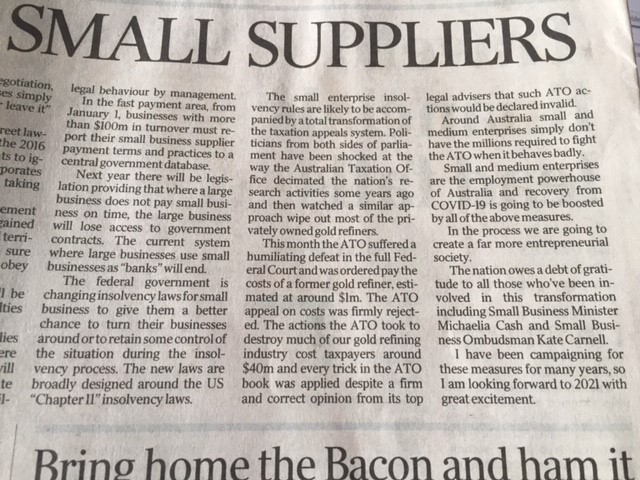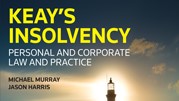Blog
Principles of Regulation of Insolvency Practitioners – an international standard
17/05/2023
practitioner regulation AFSA ARITA articles
This comment was issued in October 2018; it is re-issued in May 2023, but not updated, for interest. The rather ...
The ‘powerhouse’ of small and medium enterprises and their recovery ‘boosted’ by our new insolvency laws
21/12/2020
Blog
Interesting to know from what [limited] bases journalists get their views … ‘Finally, a fair go for small suppliers’, R ...
Insolvency protections extension to 31 December 2020
The Corporations and Bankruptcy Legislation Amendment (Extending Temporary Relief for Financially Distressed Businesses and Individuals) Regulations 2020 serve to extend ...
Protected: Australian Insolvency Losers System (in vol admin) – commercial in confidence
There is no excerpt because this is a protected post.
Too much independence? a re-issue of my 2016 commentary
23/02/2020
Case law commentary independence Law reform
My analysis below of the law of insolvency practitioner independence, written in October 2016, is reissued in February 2020 in ...
Review of Australia’s insolvency safe harbour – s 588GA
03/02/2020
insolvent trading NZ safe harbour General
Australia’s ‘safe harbour’ regime under s 588GA is due for review, since September 2019, as to whether it offers the ...
Democracy, Human Rights and the Judiciary: the common law and the wider world
02/09/2019
Refugee law UK human rights Blog
The Australian Academy of Law is hosting a presentation by Sir Nicholas Blake on this Wednesday 4 September 2019, in ...
Cafés and restaurants – at a tipping point, in 2018, and now?
22/07/2019
cafes and restaurants STP General Articles
In light of current (July 2019) reports about restaurants’ tax [non] compliance, my article of a year ago, 15 July ...
Keay’s Insolvency – note from the authors – progressive updates since publication
24/02/2019
General Books and journals Blog
As the authors of Keay’s, and in order to assist readers, we propose to make brief reference to law changes ...
ASIC’s review of liquidators for 2017-2018 – continued fall in complaints
This ASIC Report 610 has been released, with some interesting points to note, and questions raised. It largely expands on ...
Bills subject to scrutiny
That a bill is introduced into parliament after an extensive period of community consultation does not necessarily mean that it ...
Litigants in person – issues for judges
Judges have to be careful about making public statements on current issues that may allow claims of bias. There can ...
The Hayne Report – lessons for lawyers – Australian Academy of Law event
15/02/2019
General Hayne Royal Commission Report Blog
The relevance of the ‘Hayne Report’ for the legal profession is the subject of the first of the Australian Academy ...
Director identity number bill now before parliament
A number of bills broadly concerning the registers of information held by the Commonwealth have been referred to the Senate ...
Building security of payment laws – the impact of the claimant’s insolvency
Now that we have some consistent security of payment laws across the states and territories protecting building sub-contractors, there is ...
Litigation ‘for the benefit of creditors’ – really?
How much do unsecured creditors receive out of a liquidation or bankruptcy from any ‘successful’ judgment obtained by the liquidator ...
The future of the insolvency ‘profession’
I was pleased to have given a presentation on the future of the insolvency profession, at Griffith University’s excellent Professional ...
Insolvency administrator’s lack of attention to the sale of complex assets
A UK insolvency administrator has been found to have acted in breach of his duties to a broadcasting company, some ...
Coshott – a field of study?
11/02/2019
Blog
Robert Gilbert Coshott was made bankrupt on 7 November 2008: see Shipton Lodge Cobbitty Pty Ltd v Coshott (No.2) [2008] ...
Last minute attempts to avoid a business being liquidated
When directors appoint a voluntary administrator the day before their company is before the court on a creditor’s winding up ...
Practitioner’s bankruptcy registration cancelled, and liquidator registration indefinitely suspended
A bankruptcy disciplinary committee has issued its reasons for deciding to cancel the registration of a trustee in bankruptcy, based ...
Hayne Report – banks and receivers and agricultural enterprises
04/02/2019
General Hayne Royal Commission Report Blog
The Hayne Royal Commission declined to examine the conduct of receivers appointed by banks, in particular over agricultural enterprises. Nevertheless, ...
The costs and time in administering justice
Newspaper analyses of the work of judges by reference to numbers of matters heard, words written and time taken can ...
Bad timing? or will Euclid save the day?
02/02/2019
calculation of time Case law History General
Calculation of time limits in law should be straightforward but judges have taken us to the mathematics of Euclid and ...
Categories
Main Menu

























